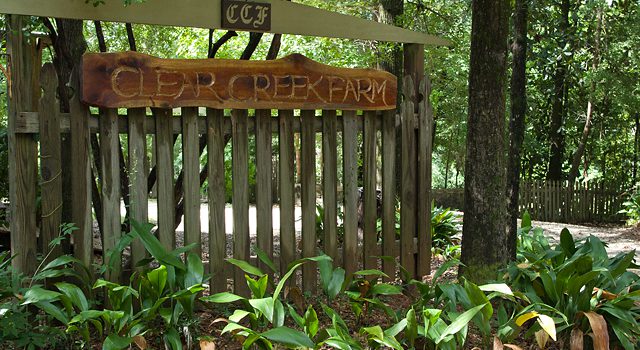About Us
About the Farm
Wanda and Ray Davis, she, a retired English Professor and he a retired insurance and financial service professional for 45 years thought it would be fun to try their hand at farming to keep active and learn to grow their own food in retirement. Clear Creek Farm came into existence in 2004 when they purchased 30 acres of land just west of Whiting Field NAS off of highway 87. The land has hills and flood plain with upland slash pine and hardwoods and diverse trees and shrubs sandy soil and a number of fresh water springs.
Clear Creek bisects the property on its way to the Blackwater River. What the land doesn’t offer is fertile, level ground. Through the use of innovative container, raised bed, passive hydroponics, and high tunnel gardening, they are able to provide for their needs and sell fresh naturally grown food almost year round. They are self-taught growers who rely heavily on the methods espoused by the late Mel Bartholemew in his square foot gardening books to grow their produce. They looked to county extension agents and IFAS programs to grow their knowledge. In the early years, Blake Thaxton and Mary Derrick offered great advice and service programs which broadened their understanding of what it takes to grow your own food. Retired county agent, Dan Mullins had a mission to re introduce the historic Alabama Shell apple tree to the area and taught Ray to graft the fruit trees. The Davises are active on agricultural small farm advisory boards and do outreach to the community working with youth in schools and churches, home school groups and the general public through workshops, seminars and tours of the facility.
Sustainability
Sustainability is more than a buzz word to Ray and Wanda Davis of Clear Creek Farm. They invested in 15kW of photo voltaic solar panels to provide for the farm’s electrical needs. They compost garden plant material and vegetable kitchen waste, weeds, wood chips, grass clippings, tree leaves, shredded newspaper and junk mail to enrich soil used in their containers and raised beds providing rich growing material with no chemical fertilizers. They use red wigglers to provide rich liquid and solid vermicompost. In 2013, they invested in a plug-in hybrid Ford Fusion Energi for delivery and the commute to the farm and are averaging nearly 300mpg in the vehicle which they charge with their solar panels. In 2014, Clear Creek Farm was named Innovative Farm of the year in Santa Rosa county.
They used a variety of found materials such as salvage pallets to repurpose in composting and other projects around the farm. When trees had to be cut to provide sun for the solar panels, the trees were taken to a local sawmill and cut into useful boards and beams for farm projects. Limbs and brush produced by the process were chipped and aged for compost material. Whenever possible, non GMO heirloom variety seeds are used and the plants are allowed to produce some of the seed for the next planting. Care was given to protect the highly erodible land from washing into the flood plain and Creek through a series of terraces and retaining walls, diversion ditches and retaining pools. Rain water from the ag barn roof is recovered and made available for garden watering. One of the natural springs provide geothermal value for the year round growing of produce in the high tunnel houses be keeping the root zone temperatures moderated winter and summer without hydrocarbon fuel sources warming or cooling the growing houses.
Being part of the community is a strong focal point for Clear Creek Farm. We feel it’s very important to provide quality local food and give the opportunity to educate the community and support local efforts for community gardens and school projects to teach youngsters where food comes from and how to grow it.
Clear Creek produce has been featured in on line markets such as the Local Byte, local restaurants such as the Global Grill, Jacksons, and The End of The Line restaurants in Pensacola and will soon be offered in Milton. Products from the farm have also been used in the famed New York Chef Frank Beard’s showcase of Gulf Coast cuisine. And scion wood from those heritage Alabama Shell trees has made its way to a refugee camp in Uganda, Africa.
